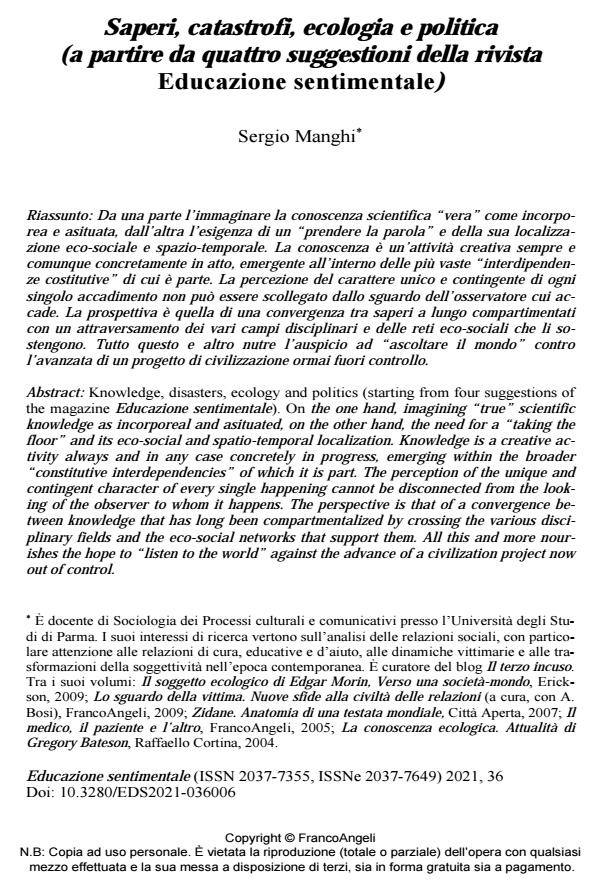Knowledge, disasters, ecology and politics (starting from four suggestions of the magazine Educazione sentimentale).
Journal title EDUCAZIONE SENTIMENTALE
Author/s Sergio Manghi
Publishing Year 2022 Issue 2021/36 Language Italian
Pages 9 P. 55-63 File size 272 KB
DOI 10.3280/EDS2021-036006
DOI is like a bar code for intellectual property: to have more infomation
click here
Below, you can see the article first page
If you want to buy this article in PDF format, you can do it, following the instructions to buy download credits

FrancoAngeli is member of Publishers International Linking Association, Inc (PILA), a not-for-profit association which run the CrossRef service enabling links to and from online scholarly content.
On the one hand, imagining "true" scientific knowledge as incorporeal and asituated, on the other hand, the need for a "tak-ing the floor" and its eco-social and spatio-temporal localization. Knowledge is a creative activity always and in any case concretely in progress, emerging within the broader "constitutive interdependencies" of which it is part. The perception of the unique and contingent character of every single happening cannot be dis-connected from the looking of the observer to whom it happens. The perspective is that of a convergence between knowledge that has long been compartmentalized by crossing the various disciplinary fields and the eco-social networks that sup-port them. All this and more nourishes the hope to "listen to the world" against the advance of a civilization project now out of control.
Keywords: asituated knowledge, localized knowledge, disciplinary interdepend-ence, observer looking, “purification” of sociology, listening, civilization project out of control.
- Manghi S. (1984). Il paradigma biosociale. Milano: FrancoAngeli.
- Ceruti M. (2015). La fine dell’onniscienza. Milano: Studium.
- Ceruti M., Bellusci F. (2020). Abitare la complessità. Milano: Mimesis.
- Dupuy J.-P. (2007). La science, une théologie qui s’ignore. In: La marque du sacré. Paris: Flammarion.
- Eriksen T.H. (2017). Fuori controllo. Per un’antropologia del cambiamento accelerato. Torino: Einaudi.
- Latour B. (1998). La scienza in azione. Introduzione alla sociologia della scienza. Roma: Edizioni di comunità.
- Latour B. (2000). Politiche della natura. Milano: Raffaello Cortina.
- Latour B. (2019). Essere di questa terra. Guerra e pace al tempo dei conflitti ecologici. a cura di N. Manghi. Torino: Rosenberg & Sellier.
- Manghi S. (1990). Il gatto con le ali. Ecologia della mente e pratiche sociali. Milano: Feltrinelli.
- Manghi S. (1998). Sociobiologia. In: AA. VV., Enciclopedia delle scienze sociali. Roma: Istituto della Enciclopedia italiana.
- Manghi S. (2010). La conoscenza ecologica. Attualità di Gregory Bateson. Milano: Raffaello Cortina
- Manghi S. (2020). Complessità. In: O. Aime et al., a cura di, Dizionario teologico interdisciplinare. Bologna: EDB.
- Maturana H., Varela F. (1985). Autopoiesi e cognizione. Padova: Marsilio.
- Ronchi R. (2017). Il canone minore. Verso una filosofia della natura. Milano: Feltrinelli.
- Stengers I. (2005). Cosmopolitiche. Roma: Sossella Editore.
Sergio Manghi, Saperi, catastrofi, ecologia e politica (a partire da quattro suggestioni della rivista Educazione sentimentale) in "EDUCAZIONE SENTIMENTALE" 36/2021, pp 55-63, DOI: 10.3280/EDS2021-036006